Text
FF7 Rebirth Ending Interpretation
Well. That game sure was a ride, huh?
As stated above, I’ll be talking about my interpretations of the ending. Please note that I’m writing this about two weeks after the game came out (for future reference). Obviously, spoilers for the entire game ahead/under the cut.
The main question of the ending if, of course, rather obvious: did Aerith die or not?
Cloud sees her alive and well, but the rest of the party doesn’t and is grieving her death. With how Cloud was set up since Remake and especially throughout Rebirth to be the one with hallucinations and delusions, one would think the answer to the question of “what is truth, what is fiction?” should be obvious, right? But… what if it’s not as clear-cut as the most obvious answer? What if Cloud is the one who sees reality and not his teammates? What if we have (finally, for some) left the “original world” of the OG behind and are now 100% in a different world, similarly to how Remake dangled that option in our face more subtly?
Yes, you read that right. My personal belief is that Aerith didn’t actually die, at least not in the world we see in the ending scene. There is a world where she died, of course. The world of the OG. But this is not the world we get to see at the end of Rebirth, and possibly not the one we will play in Part 3.
Hear me out.
1) The framing of Aerith’s death.
In many other “ending explanation/interpretation/theory” videos I watched on YouTube these past few days, everyone always comments on how we’re “teased” with Aerith surviving before ultimately seeing her die. But in none of them did I see anyone comment or talk about the way this vision of a death is brought about. It’s not the the first thing we see. It’s not that we see her live and then get a fade-to-black or fade-to-white like in other parts of the game. No. Instead, the shift is done in a very telling, very specific manner: the static that indicates Jenova’s interference with what is being remembered or perceived. Whichever of the two is the truth, Jenova is making Cloud (and us) see the other option. It’s not a glimpse at what was or what could have been. It’s all Jenova.




So, having established that, why do I think Jenova is fabricating the vision of Aerith’s death, and not her survival? Well, let’s look a bit closer at both the framing and how Jenova’s interference is portrayed through most of the game.
A) The “mechanism” of Jenova’s memory and perception editing
We’ve seen Jenova (also referred to as Mimic for the particular ability to copy a person’s memories) interfere with Cloud’s memories and his perception of reality many times throughout both games. In Remake, this was mostly in cases when:
- Jenova had to edit memories in the background so Cloud’s fake persona was still believable, for example in the very first chapter where he went “I’ve never been to a reactor like this before” because “the layout depends on when a reactor was built”.
- Jenova interfered with Cloud’s immediate perception to block some things out, primarily any mention of Zack.
- Sephiroth appeared before Cloud.
In Rebirth, it goes a bit further than that. We see Jenova edit Cloud’s memories in real time in Nibelheim when he first remembers Zack. We see Jenova ensuring he doesn’t see Tifa’s scar when she shows it to him a second time in Gongaga, with the implication that his memory of seeing it in Kalm has also been altered, only for everything to be edited back once Tifa falls into the mako. And of course, there are again the appearances of Sephiroth, as well as the frantic editing going on in the ending itself (very reminiscent of Nibelheim, might I add).
Of note here is how it’s all portrayed, which is what I mean by “mechanism”. There might be some discrepancies between Remake and Rebirth as Cloud’s situation changes, but throughout Rebirth itself, there is one definite consistency to every time Jenova messes with Cloud’s mind, be it his memories or his immediate perception. Namely, that we as the player first get a look at reality (whether obvious, brief, or much earlier in the game in the case of Tifa’s scar) before the editing kicks in and we see Jenova interfering, if not outright seeing how it changes Cloud’s memories or perception. In a lot of cases, we also see reality againafter the interference is over, to further drive home that Cloud is seeing things the other characters are not.
Why is this important? Because assuming the ending doesn’t pull a (rather random) deviation from that set-up, the first thing we saw was Cloud managing to save Aerith before the camera zoomed in on the clean blade. Only then did Jenova’s interference start. Looking at it from how it worked for the rest of the game, Jenova was attempting to alter Cloud’s perception and see blood where there was none, rather than the opposite.
B) The general framing of the scene
Setting aside whether we see reality first and the lie second or the other way around purely from an “it’s been like this the rest of the game” assumption, there is another thing. Namely, Jenova’s interference was only ever present in regards to Cloud. He was the one whose memories were tampered with, he was the one who didn’t always see things as they actually were, he’s the one who can (and sometimes is) controlled by Jenova/Sephiroth. But in the ending, there’s one interesting detail that I think warrants consideration.
When the rest of the party is allowed to enter the City of the Ancients and come running, it is after the first bout of Jenova’s interference ends. After Aerith tells Cloud that “it’s okay” and he’s relieved because she actually looks fine after all.
The first shot we get of the two as the others arrive is this one.
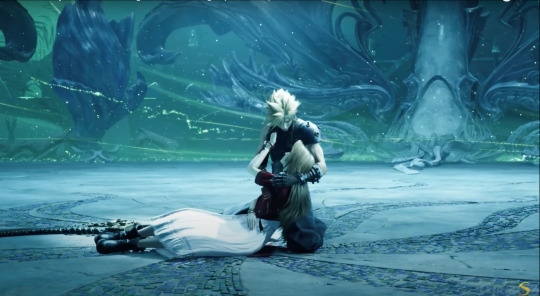

We can argue until we’re all blue in the face if the dark spot under Aerith in this shot is blood or just a shadow, though I do agree it looks a whole lot like blood. Still, we can tell that that spot aside, there is no blood anywhere else. There are no dark spots on Aerith herself (on her hand), or on Masamune. And then an interesting thing happens as the camera swoops in on Tifa as if to tell us “this is a PoV change, we see what she’s seeing now”. Which makes sense. Throughout Rebirth, Tifa has been set up as the main person who can notice when Cloud is being weird, or when his memories are weird, which was also pretty much the case in the OG. She’s the one we, the players, are supposed to trust when Cloud is acting off or remembering things she thinks are odd. Unlike Cloud, she’s not affected by Jenova. She sees the truth.
Except when she doesn’t. The thing is, we get the camera swooping in on her to indicate the PoV change to her… and then the following shots are full of Jenova’s interference all over again, shifting between seeing blood and not seeing any. However, Tifa’s (and Barrets) reactions make it clear what it is they actually see: Aerith, dying or already dead.

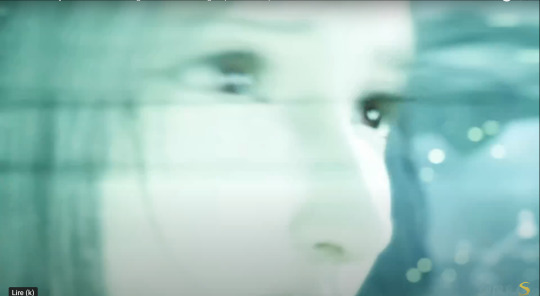


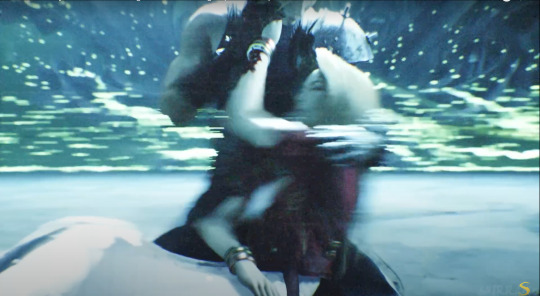

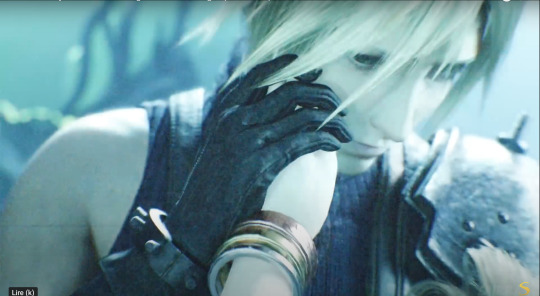


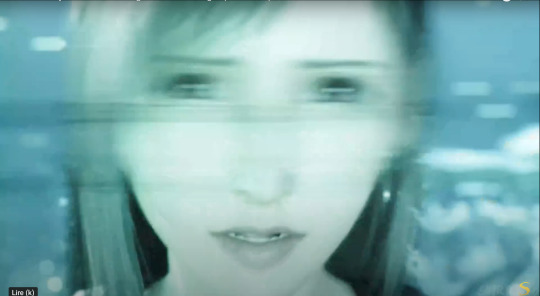

Question: if Aerith dying is reality, why is there a Jenova static effect in what Tifa sees? Just to throw us off? To confuse us?
Maybe so, but honestly, it feels a little odd to throw it in if Jenova wasn’t actually manipulating someone’s perception. And those of us who played the OG know very well that Jenova’s ability to make people see something else than reality isn’t limited to those who have her biological material in them. Otherwise, she never could have fooled the Cetra.
And there is another thing: the last scene with Rufus and “Glenn”, who turns out to be nothing but a Shadow of Sephiroth.
Rufus has never been in contact with Jenova. He doesn’t have her biological material in him. But he has been made to see Glenn (and then briefly Sephiroth) in the place of a simple Shadow of Sephiroth (or Sephiroth Clone, as they were called in the OG localization). This feels like the game reminding us – or letting those who never played the OG know – that Jenova indeed isn’t limited to Cloud in fucking up in their perception.
But wait. There’s an issue here, isn’t there? After all, even after the fight and after Sephiroth is gone from the City of the Ancients, Cloud is still the only one who can see Aerith just fine. The others don’t see her at all and still think her dead. If it’s indeed their perception being messed with and not Cloud’s, why is it not lifting? Any other time Jenova tried fucking with Cloud, he saw the truth eventually. Well, let’s look a bit closer at what we, and the characters, know of Jenova’s abilities, shall we?
2) Jenova’s Abilities and Limitations
I’ll be pulling mostly from Rebirth here (since Sephiroth and the Cetra so kindly gave us so much Jenova lore), but also a little bit from the OG regarding details I believe to be important even if they have yet to come up properly in the Remake trilogy, as well as CC(R) as a source of additional proof where necessary.
Jenova’s abilities are, to be frank, a terrifying combo. To summarize, it can
- appear as someone else, usually taking the form of a deceased whom its current victim used to know
- edit someone’s immediate perception of the things around them in real time (which is probably how the implied shapeshifting actually works, but as far as I know there’s no hard confirmation on that; not that it really matters for this meta)
- copy someone’s memories (a form of mind reading, I guess)
- edit its own DNA and memories (or the memories of a host some of its biological material is stuck in)
- a form of telepathy where it can put images/thoughts in people’s heads (as evidenced by Sephiroth, Cloud, and also strongly implied through Angeal and possibly Genesis in CC(R))
- furthermore, these abilities aren’t restricted to Jenova as a “complex lifeform”, but can be used and called upon even when it it’s in scattered pieces as small singular cells.
So, in short, we’re talking about an intelligent life-form capable of mind-altering/affecting abilities with possibly full on shapeshifting to top it all off (not that Jenova needs it), and with every single piece of it capable of using those abilities on its own. Of note here is that the players know all this (and even then only those who played the OG; newcomers can certainly guess at some of those abilities because they’ve been shown in action, but they haven’t had them explained in detail). The characters, on the other hand? All they got is what Sephiroth told them of Jenova’s abilities on the ship to Costa del Sol.
“They say she’s a monster. That she can peer inside you - into the very depths of your soul. That she can become those you hate. Those you fear. Those you love. And they call her… Jenova.”
He tells them about the mind-reading. He tells them about the “shape-shifting” which we, the players, know could work in two ways. He certainly doesn’t mention the ability she has of putting thoughts in your head or visions in your mind, altering your perception of things, though. Which is why Cloud thinks these things happen to him because of Degradation instead. It’s the only explanation he (or anyone else in the party) have.
There are also some limitations to Jenova’s powers (thank God for that, right? LOL). For one thing, distance. Jenova doesn’t seem able to affect someone without being in their close vicinity or, alternatively, having someone with its biological material in the vicinity of the manipulated person. This, of course, doesn’t apply to someone who already has Jenova’s biological material inside them, because they’re as close to the source as they can get.
The second limitation is rather more interesting, but also requires a little more assumption and, like the shapeshifting, can go two ways.
Any time we see Sephiroth, it is quickly revealed that it’s actually a Shadow of Sephiroth instead whom Cloud and the party perceived as Sephiroth (or whom Rufus perceived as Glenn). This implies one of two things:
a) Jenova can’t make people hallucinate something “from thin air”. By that I mean, Jenova can’t create a hallucination of a whole-ass person acting all normal if there is nothing but air in reality. It needs a base to build off of. That’s why, in Rebirth, whenever Cloud sees Sephiroth, it’s in actuality a Black Robe. Or
b) Jenova could create a hallucination from thin air, but chooses not to because of a different limitation: it can trick the eyes and ears, but not the sense of touch.
If it’s the first one, then the Aerith Cloud sees cannot be a fake created by Jenova because Jenova wouldn’t be able to make Cloud hallucinate her. In which case, if she’s not real, then Cloud is hallucinating her all by herself. Which, sure, is possible, but it definitely creates very big narrative problems in that it indicates a mental break the likes of which Cloud didn’t have in the OG, and for good reason. While he has more then enough reasons to be messed up and traumatized, most of Cloud’s serious mental issues in the OG were all created by Jenova. His hallucinations, his fake personality, his uncertainty of whether or not he was ever a real person… all because of Jenova messing with his memories and Sephiroth exploiting that and manipulating him. Which means the source wasn’t Cloud’s own mind, but an eldritch abomination from space. And as such, the problem could largely be fixed by just “doing something to set him straight”, which in the OG was what the Lifestream Sequence accomplished.
If Cloud is now hallucinating Aerith without Jenova’s input because he can’t face her death, then that’s an entirely different ball game and I cannot see it being satisfactorily resolved without Cloud having to be benched and someone else taking over and finishing things. Which, granted, happens for a time in the OG as well while Cloud is mako poisoned in Mideel, but it’s not nearly for a long enough time for Cloud to recover from a mental break such a this. That would take years. And unless he passes the “main character and hero of the story” baton to someone else, it ain’t happening.
I don’t know about you, but that wouldn’t just be a letdown for me, it would be downright insulting and dismissive of mental illnesses in a way in which FFVII never was.
Okay, so let’s say Cloud hasn’t completely broken down mentally and hasn’t started hallucinating Aerith all by himself. Let’s also say that Jenova isn’t making him hallucinate her from thin air. So, she’s real. That still leaves us with one glaring problem.
Why can’t the others see her?
Well… there is one last thing Jenova can do that I haven’t mentioned yet. Something Remake has exploited and very vaguely teased.
Jenova can warp one’s perception so they don’t see or hear someone who is actually there.
This ability comes the most prominently to the front in the OG when the party visits the Northern Cave and shortly before Cloud gives Sephiroth the Black Materia again. During that scene, Tifa yells and yells at Cloud to not do it, but what she says is no longer in the typical speech bubble, but rather almost like a narrator voice over the screen. One of her questions at that point is “you can’t hear my voice?”
No. Cloud can’t. And in fact, none of the other characters in the scene act like they see or hear Tifa at all.
Rebirth hasn’t really touched on this ability yet. But Remake has alluded to it several times when Cloud saw Sephiroth (who was likely a Shadow of Sephiroth again), and then nothing and no one at all. In one scene, when Cloud, Barret and Tifa are on the way to Aerith’s house after the Platefall, we even get a direct comparison when Cloud sees Sephiroth, and then we get to see through Tifa that there is seemingly no one there.And then, there is the scene in the Drum, where Cloud is experiencing another Jenova episode and Tifa slowly approaches him. We see there is no one on the walkway up ahead. Then we get a close-up of Tifa and Cloud as she asks him if he’s okay before looking ahead again, and her eyes grow wide. Because suddenly, Sephiroth is there.
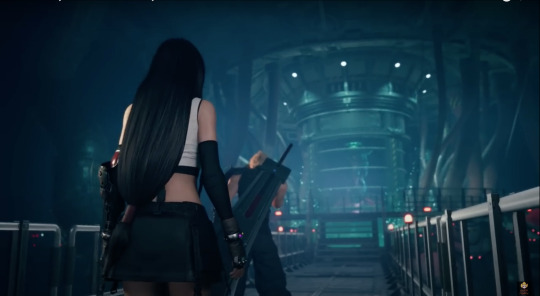
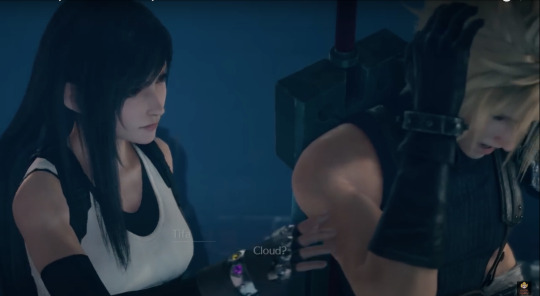
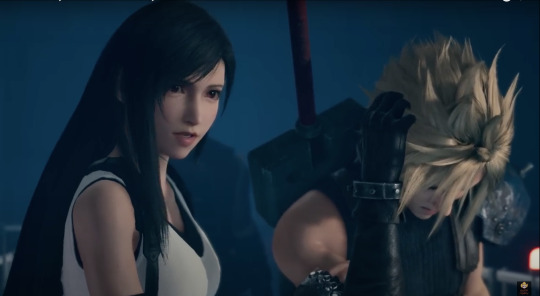

It’s subtle, but it is a hint at that particular part of Jenova’s perception-manipulating abilities, I believe.
It doesn’t help that in Rebirth’s final scene, Aerith doesn’t even really try to talk to anyone but Cloud. She doeslay a hand on Nanaki’s shoulder and he does acknowledge it, but is it a case of him sensing her spirit, or him feeling her physical touch but still being unable to see her? Both are equally possible, but I think you don’t need me to tell you which one I believe is happening.
But wait. I said myself that one of Jenova’s limits regarding mind manipulation seems to be distance. If so, how can the rest of the party still not see Aerith after Sephiroth and Jenova are gone?
Well, we’ve already established that Jenova can manipulate someone – anyone – and that she doesn’t need to be whole to do that. A fragment of her is enough. That’s why it can constantly play with Cloud’s mind whenever. Because he does have her cells (or Sephiroth’s cells) inside him. And here’s the thing: by the end of Rebirth, he’s, in my opinion, more than close enough to a Shadow of Sephiroth to be the “conduit” for Jenova to manipulate the others. He was basically completely taken over for most of the Temple of the Ancients, for one thing, something that was made painfully obvious when you still controlled Aerith rather than him when the group reunited (something that didn’t happen at any other point of any other character), and then when you played him going after Aerith and the Black Materia after the Temple’s collapsed. If you try to not go after her and pull the joystick back, Cloud starts shifting and contorting very much like a Shadow of Sephiroth that is being pulled towards a given destination. The only real difference between Cloud and them would be that he’s not as Degraded – not in body and not in mind – and so he isn’t fully lost or at the “I can only slowly shuffle forward” stage.Alternatively, of course, there can also be a Shadow of Sephiroth somewhere close by without the party knowing, but that demands a little more suspension of disbelief and, at least to me, feels like reaching.
3) A Different World
All right, so I think I’ve established why it’s possible for Aerith to still be alive. That leaves one last part of my claim still to be discussed: that we’re in a different world at the end of Rebirth than at its beginning.
Let’s go back to the framing of the scene again. If you look at the exact moment when Cloud breaks free of the Whispers and parries Sephiroth’s blade, we see a brief flash of a “rainbow” before Sephiroth is pushed back. From that point onwards, up until Cloud catches Aerith in his arms as she falls, the entire altar is circled not just by Sephiroth’s Black Whispers (which quickly leave), but also this rainbow glow.This glow is the effect Rebirth uses to show a creation of a different world. A different possibility. A fork in the timeline. We’ve seen it multiple times with Zack, as obvious as in this scene and far more subtle, whenever he made a choice. The most blatant example that comes to mind is the scene where he was picking the left or the right tunnels to go to either Hojo or Biggs.

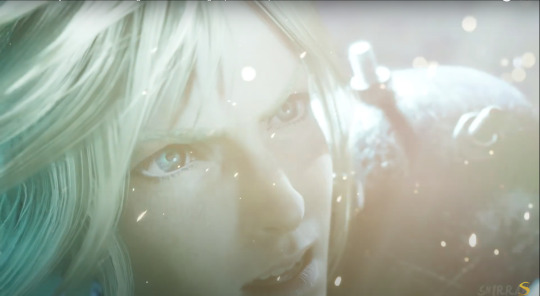
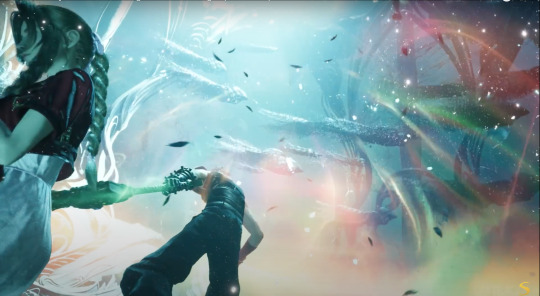
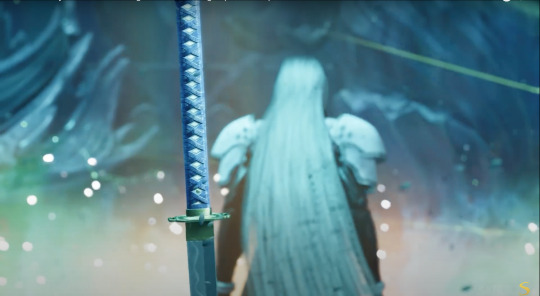
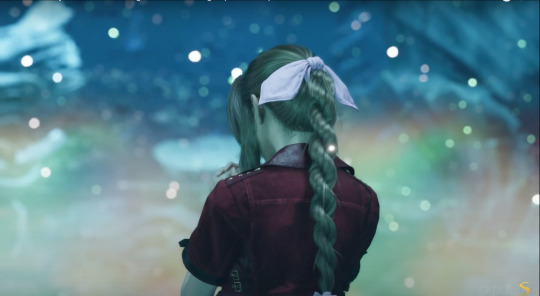
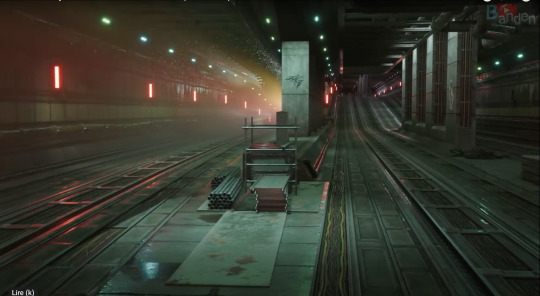

There is one thing to note, though: whenever this effect made an appearance to indicate that “multiple possibilities have been created”, we didn’t immediately jump between them. We followed the first choice made and remained in the same world. When Zack chose to go to Hojo, we saw the possibility being created that he went to Biggs instead, but the next scene of him we got was still at the Shinra Building where he wanted to meet with Hojo. What’s more, we didn’t see multiple approaches of that (like Zack trying to go in through the front vs Zack trying to enter through the parking lot like the party did – and nobody can tell me there’s no way he didn’t at least think of the option). We see him facing a platoon at the main entrance. We see him confront them. And then we get a “fade-to-white” that… kinda seems to indicate the end of that particular story. Only then do we see the Pug-Stamp world where Zack went to Biggs, and only after that do we see the third option where he went to neither and visited the church to make up his mind instead.
What this means is that when Cloud saved Aerith, he created a fork in the road, a new world, and going by other obvious instances of this, there is little reason for us – or the story – to randomly jump off the road he just created to another alternative. So by pure logic, we should be in the world where Aerith survived.
4) The “problems” such a twist would create
Now, time to hit the most controversial issue. If Aerith actually survived like I believe, I can already imagine the havoc most of the fandom will raise. “But her death is iconic! It must happen! She can’t cast Holy without dying! She can’t save the Planet from the Lifestream if she’s not in it! She can’t stop Meteor!”
To those people I say: kindly shut up and listen for a spell.
Aerith’s death in the OG is indeed iconic… but most of the reason it hit so hard in the OG was because it was so unexpected. That’s a feeling that could never have been replicated in Rebirth, because everybody and their mother seems to know by now that Aerith died in the OG. Everyone was waiting for this moment to see how it would play out. Very few are the exceptions who don’t know. But as for everything else… I’m sorry to burst your nostalgic bubble, but it’s not true. Any of it.
Aerith did not need to die to cast Holy. Holy was already cast and Sephiroth could hold it back by sheer will alone. Aerith dying did not make Holy stronger or anything of the sort. It was not the price for casting Holy, either. If it was, Sephiroth wouldn’t have even needed to impale her.
Aerith also doesn’t need to die to command the Lifestream, something which we see far more reinforced in Rebirth than we did in the OG. She’s using the Lifestream just fine in the Temple to shape it as she needs it, after all. Sure, she first needs to learn how to do it, because she never had the chance to learn before, but she absolutely can do it without being dead. There is no reason to think she’ll need to die to use the Lifestream to stop meteor in this case. What she does need is to learn how to do it.
I hate to have to remind people of this, but in the OG, the whole “point” of Aerith’s death was that it was senseless. It had no narrative meaning. It was no noble sacrifice; it was not something that “needed to happen for the greater good”. It happened, yes, and the remaining characters grieved her, but had she survived, the story’s narrative would not have changed one iota. The emotional impact of her death would be gone because she wouldn’t be dead, sure, but outside of that emotional hit, her death did nothing to advance the story in terms of narrative. It gave the party an additional reason to want to stop Sephiroth, but it’s not like they needed another push, either. Most of the fandom seems to have convinced themselves that she needed to die, and I assume it was a form of coping with the unexpected loss given that she is a fictional character in a story that very typically would paint an MCD as something that was “necessary for the greater good”, but that is not the case here. And that was the whole point.
So, those worries people have about her casting Holy or stopping Meteor? Yup, still possible with her alive. Her survival does not actually doom the Planet.
5) The Narrative Purpose of Having Aerith Live
Finally, one last thing you might be wondering about: narratively speaking, what is the point of having Aerith survive, but have most of the party not be aware of it? Why would Jenova/Sephiroth want that? If Aerith’s death is one big mindfuck created by Jenova, how is Cloud of all people immune to it this time? And why does she stay alone at the City of the Ancients to "pray"?
Well, what Sephiroth wants is basically for Cloud to not trust his companions and vice versa. He wants him isolated and susceptible to his manipulations. He wants to have him as his puppet to use and torment. What can I say? The man is obsessed.
His first attempt at breaking Cloud was, as in the OG, by killing Aerith. When that failed, he tried to have him believe Aerith died anyway.
Except at the end of Rebirth, Cloud is very determined to not believe one word Sephiroth says. And this is important because as powerful as Jenova is, its power and influence can be overcome if one’s willpower, one’s sense of who they are, one’s heart (one’s kokoro, a word that’s often translated as “heart” from Japanese, but the concept of which encompasses all those other things as well) is strong enough. And Cloud does have the potential to be strong enough to overcome it. He does in the OG. It’s a big part of how he ultimately recovers his true self. The problem is, the way Rebirth portrays it at the end, Cloud is in this odd space where he’s on one hand supremely vulnerable to Sephiroth’s and Jenova’s manipulations, and on the other hand begins to tap into that true strength of his that allows him to overcome Jenova.
So what I think happened is that Jenova tried to make Cloud see Aerith as dead, but when she reached out and spoke to him, he broke free of that control and suppressed Jenova’s ability to twist his own perception of things, but not Jenova’s ability to affect others because he doesn’t even know about it. That’s why, for a short moment, we see things as they are again. We see Aerith being fine.
And then the others arrive and Jenova basically flips the coin and starts manipulating them. The end result of which will be the same… if not potentially worse, depending on how things go.
Think about it. Rebirth set Cloud up as the unreliable narrator even better and more poignantly than the OG did. Furthermore, after her first dip in the Lifestream and remembering the whole thing with climbing Mt Nibel as kids, but not experiencing a revisit of any other memories, Tifa has little reason to doubt her recollection of Nibelheim. Especially since Cloud’s recollection changed to partially fit hers once he remembered Zack. Tifa, and the rest of the party, are far more likely to believe their own eyes and Tifa’s version of the past should she speak up than Cloud’s at this point. None of them have any reason to believe they are suddenly the ones seeing things.
Cloud himself is also far more aware of how unreliable his memory is. So if confronted with something he and Tifa remember (or saw) differently, who is he more likely to believe?
This can all further play into Sephiroth’s attempt to convince him that he’s merely a puppet. That nothing he thinks or remembers or believes is real. And the thing is, Sephiroth (whom Cloud resists supremely now) doesn’t even have to do a single thing. The party will do it for him, because I can’t imagine them notaddressing the fact that they believe Aerith died, yet Cloud acts like nothing is wrong.
And who can ever correct them or anything? There’s only two things that could help: one, the Lifestream Sequence as per the OG so Cloud can piece himself together. Or, alternatively, the one person who can confirm that there is some truth to Cloud’s recollection of Nibelheim and that he was indeed there even if Tifa has no clue about it: Zack.
Of course, Zack is in a different world altogether, so him playing this kind of major role is up in the air and very dependent on the exact inner workings of the multiverse created here. I have plenty of thoughts on that, too, but that’s for another time.
Either way, this sets up Cloud to be isolated from the party all by his own and the party’s doing. And you know what this seems to fit? Cait Sith’s fortune from all the way back in chapter 8 of Rebirth.
Yes, yes that fortune.
The fortune that spoke of a “last minute twist” and how Cloud “would lose what he cherished most”.
Those who watched Advent Children know what it is that the real Cloud cherishes most: everything. “There is not a thing I don’t cherish!” And right now, even though Aerith survived, it does seem like he’s set up to lose it all unless something is done.
As for Aerith staying behind, consider this: unlike in the OG, we don't awaken in Gongaga a few days after everything at the Temple. Aerith hasn't been gone for at least a day. We don't have to waste time going after her by figuring out we have to go to Bone Village (factor in Tiny Bronco voyage time here), we don't have to lose time mining for a Lunar Harp. The party enters the Sleeping Forest at the same time as her, but then just "loses her in the fog". When Cloud wakes up, he sees the Whispers and guides them the right way.
Unlike in the OG, we don't get to the City of the Ancients at least one day after Aerith, if not more. We get there a couple hours after her at most, if even that. In fact, when Cloud approaches her, we hear her start praying. Unlike in the OG, there is every chance she didn't finish casting Holy - had barely even started - by the time Sephiroth interrupts and quite literally crashes the party.
Setting Holy aside (because Cloud could very well find some sort of excuse to stick around until she finished, especially given how the rest of the party were reluctant to leave because of grief and the fact that the Tiny Bronco needed fixing for flight), we could also assume she's staying behind to "pray" as in "to learn to control the Lifestream better" - something that's clearly established in the Temple of the Ancients that she needs guidance in, and gets it from the Lifestream itself. Finally, this Aerith has a working White Materia, which seems to have some connection with her future memories... if not downright with a "post-OG Aerith" who already exists in the Lifestream, just like we suspect there is a "post-OG/AC Sephiroth" who's pulling Cloud's strings.
Some explanations seem more farfetched than others, I'll give you that, but there can be reasons found for why she stays behind even if she isn't, in fact, dead.
And with that, I believe I said everything I had to say on this particular subject. I hope you enjoyed reading :)
#FF7 Rebirth#FF7 Rebirth Ending#FF7 Rebirth Spoilers#Ending Interpretation#Meta Analysis#Glon's meta wordvomit
11 notes
·
View notes
Text
After months (years?) of tumblr inactivity, I am finally back (we'll see for how long, though ^^'). What brought me back? The need to talk about FF7 Rebirth, that's what. Figures it would take a brand new obsession to get me back to gushing on tumblr LOL
As the game only came out two weeks ago - MAJOR SPOILERS UNDER THE CUT
There is a lot - and I mean a lot - I could talk about regarding Rebirth, and especially its ending. There will probably be a massive meta coming up on how I interpret what happened in it in detail another time, so look forward to that! But this time, I'd like to focus on a different part than the most obvious "so... what happened to Aerith?" Namely, what I think is being set up here for Part 3.
Going back in time a bit, FF7 Remake already ended in a way that kinda-sorta promised deviation from the OG - an idea that was welcomed by some, and despised by others, as these things always go. Those who never played the OG obviously wouldn't have as much sentimental attachment to it as those who did and are "long-time fans", but even among this second set, there were those who would prefer a 1:1 remake with no changes to the story, and those who were looking forward to some things going differently.
At first glance, Rebirth listened to those who yelled for no changes. Zack should not join up with the party. Aerith must not survive. The OG story must remain largely untouched. And for better or for worse, Rebirth seemed to do just that save for a few rearrangements here and there (like the fact we skipped Rocket Town's first visit altogether for example) and some additions that didn't so much change the story, as they expanded it and tied some lose ends from Remake. But was it really all it did? Did it not set up for part 3 to possibly break free of the OG script as Remake already indicated might happen?
I think it did, in more ways than one. I think the last leg of the game is, in a very meta sense, the devs telling the players "we gave you what you wanted, and now we'll do what we want". Allow me to elaborate.
To start, let's once again look at how the "multiverse" works here. This is not the kind of multiverse we usually see in Western media, or at least not yet. Its creation began with the destruction of the Whispers in Remake - the destruction of Fate and the Planet's iron hold on the plot of the story. Instead of the Planet, it is now the characters choices that shape the story, and since they can make different choices, each one always creates a branch leading to a different world and a different outcome. We've seen that with Zack, as the devs promised he would be the one to show us what the world in Rebirth is governed by. But while the Whispers' destruction happened in the Singularity, a place outside of usual space-time, Rebirth reveals that the effects did not, in fact, affect the past, or at least not much.
I can already feel your skepticism here. What am I talking about? Zack still survived and that's a change in the past, isn't it?
Well technically, yes. But there's something very interesting about the whole thing.
First of all, how did Zack survive? Unlike what the rules of different worlds clearly are later on, it wasn't a stroke of luck, a different possibility or any conscious choice he made that affected the outcome. No. When he talks with Biggs about his last stand and his survival, he felt "wind" and we, the players, see the Whispers interfering so that one bullet grazes his cheek instead of hitting him dead between the eyes. And interestingly, it's the only time in Rebirth that we see Whispers as they were in Remake. Not the black ones with a creepy white glow under their hoods that Sephiroth controls. Not the white ones that clearly have something to do with Aerith. The regular, gray Whispers of Fate. (Incidentally, this is also one of the first times we see the rainbow-color-effect that later gets associated with the creation of a new world. More on that later.)
It was not chance or any conscious choice that saved Zack. It was the Planet, presumably right before Fate got nuked. Why? We can only speculate based on what we saw in Rebirth, but my bet is a last ditch attempt to raise the Planet's own chances at survival despite no longer being able to guide the story and characters on the known path that would lead to... well, maybe not a "happy ending", because there's plenty of tragedy incoming, but at least an ending where the Planet survives, humans do as well and Sephiroth is largely taken care of (even if he keeps coming back and annoying people LMAO).
Here's where Zack's survival becomes interesting in how it's handled in Rebirth. In your usual multiverse (at least the way we know them in the West), you would expect this to have a butterfly effect that would, in sum, amount to "Remake can't happen as we've seen it" because Cloud is no longer alone, no longer wakes up, doesn't meet Tifa or the rest of Avalanche and thus wasn't there for the first reactor bombing. But... that isn't the case. We see this already in the beginning of the game, when Zack sees the news of the collapsed express way. It becomes obvious to us, players, that this is right after Remake, and the troopers remark that "one suspect is missing" - i.e. Cloud.
This is something that shouldn't be possible, because Zack sees this news report pretty much as soon as he enters Midgar. Except... Zack died at the end of September [ ν ] – εγλ 0007. The first reactor bombing was in December [ ν ] – εγλ 0007. The end of Remake was somewhere mid-December [ ν ] – εγλ 0007, as we know everything in it only really took a few days, a week or two at most. Even if we assume it took Zack a while to drag himself and Cloud the remaining way to Midgar in the state he was in, it's difficult to believe it would take him a whole-ass month (+/- a few days). He wasn't that far from Midgar at that point. That was the whole tragedy of it.
But then that would mean that somehow, for some reason, Zack skipped ahead in time. Which he also seems to indicate even if he doesn't realize that's what happened. "One minuted, I'm outnumbered. The next, I'm alone." If we assume the Whispers saved him and something somehow made him (and his version of Cloud) skip a month, that would make sense. There would be no Shinra troopers in that spot a month later. And that something might have been either the Whispers themselves, or a side-effect of the Singularity (again, singularity is a point that warps space-time outside of its usual norms and is, in a way, outside of it). Similarly, Biggs "miraculously teleports" from the Sector 7 Support Pillar to the orphanage (since nobody can tell him who brought him or how he got there, that seems to be the implication). One of them travels in time and skips a month ahead, the other remains in the correct time, but skips in space to a different place. Similarly, Biggs's recollection of his survival is also full of the "new world rainbow effect"... but the interesting thing is that despite how it seems to work later (one choice leads to one new world), they both end up in the Terrier world. There was no butterfly effect. The past didn't change. And yet these two men, who should both have died, meet in the same space and time, both remembering their miraculous survivals.
If you're still not convinced, here's another thing: as Marlene points out, Zack was still not there in November or the beginning of December when the bombings happened. And they still happened. We know this because Biggs still knows Cloud as the "badass mercenary" . He still remembers meeting him for the first bombing, even if his memories are getting weird. ("How long ago was that again? [laughs] Weird. My internal clock's busted." "Yeah. Mine too.") And yet, Cloud was not on the express way when everyone else from the party was. He was looked for, but not found. He didn't appear anywhere afterward. There are no two Clouds in this world. There is only the mako poisoned Cloud Zack brought to Midgar. It's almost as if the Planet wanted to save him from being taken by Shinra in this weird world so it still had the Champion that can beat Sephiroth in this off-shot world, too; so it saved Zack to achieve that. (Why did it pick Biggs, though? That we don't know yet. Given his fate in one of the worlds, he almost seems to have been brought back just so the devs can kill him again, but hey, that was only one world, right?)
So. We have a mutliverse that starts off with two worlds. The world of OG/Remake (the "Beagle Stamp" world, where the main party remains) and the world where they lost against Sephiroth on the express way but Fate/the Whispers pulled a couple last strings before it/they disappeared (the "Terrier Stamp" world). But it doesn't remain at only two worlds. We later see a world in which Stamp is a Pug, a Shiba and a Spitz (I assume one of the larger breeds of German Spitz, though I'm by far not a dog breed expert LOL). Of note is that two of these words are Zack's, created by his own choices - the Pug, where he went after Biggs to reactor 6, and the Shiba where he couldn't decide where to go and who to save because he wanted to save Biggs, Cloud and Aerith, so he went to the church first. I assume the world in which he went to Hojo is the Terrier world, but we can't be sure for certain. [edit: Actually, we can. When Zack is pointing out to himself which road leads where in the tunnel, there is a Terrier Stamp drawn on the wall behind him.] As for the German Spitz, this is the world where Cloud and Aerith have their "dream date", and as far as we can tell, Zack is not alive (or at least not around) in this world. It's either that, or he's went off somewhere else entirely, and apparently so did Marlene and Elmyra. But it's not any of the worlds we've seen Zack in thus far.
(I can already imagine you wondering what any of this has to do with "the devs telling us they gave us what we wanted and will now do what they want". Bear with me a little longer. I'm getting to that.)
The particular Spitz World is important for two reasons. On the more obvious side, it's where Cloud gets a working White Materia from Aerith so that Rebirth's main Aerith can cast Holy. On a more subtle side, it shows a limitation to how far this multiverse can go, because in that world, none of Cloud's choices matter. There isn't a world in which Cloud gave Aerith a hair ornament, a world where he gave her a bracelet and a world where he gave her a pendant. There isn't a world in which he chose to pick the different snacks at the food stall. No matter what he chooses, he gets steamrolled into a fourth option, as if the world itself rejects his choices because he's technically not a part of it. He belongs in a different world.
And as we later find out, he can make a difference and create new worlds there. This is exactly what we see when Cloud attempts to save Aerith and when we see him parrying Sephiroth's blow to save her. Remember how I mentioned the "rainbow effect" being indicative of a new world being created? That scene is full of it... right up until Jenova's interference starts playing up.
So. Here we finally are at what I was trying to get at: the devs giving us the message that "they gave us what we wanted". For those fans who wanted Aerith to die, well, they now got to see it in high res. She died. There is a world in this multiverse in which she died. That's the world of the OG. That remained unchanged as they wanted. But... I do not believe this is the world we're in at the very end of Rebirth, nor the world in which Part 3 will take place.
Take another good look at the Pug-Stamp World. More importantly, listen to Zack's lines. Every single line of his in this particular world makes as much sense for him to say as it is a meta-commentary on things.
"Fate has a twisted sense of humor, and I'm always the punchline." - this is Zack's character and the summary of the plot of both CC and his appearance in Rebirth to a T.
"Well, I'm sick of its bullshit. This is my life! I make the rules!" - I don't know about you, but this really feels like the devs saying "this is our game. We make the rules." Couple that with the back and forth of Aerith's death and the final message at the end of the game: "No promises remain at journey's end", and that message only seems to be driven home even further.
Fans wanted Aerith to die? Well, she did. In one world. The OG world.
Fans wanted Zack to get out of Aerith's way because she's supposed to have moved on? Well, he did. In one world. The world where he asked Marlene about Aerith's feelings for Cloud, got a childish response that still hit him hard and took Aerith's ribbon - which was basically her one memento of him - as if to remove everything that could remind her of him, and himself, from the equation. The world in which he went to Hojo.
Fans wanted Zack to still die? Well, he did that too! Arguably in more worlds than one, even! The world where he went to Hojo for sure, and possibly the world where he went after Biggs and jumped into the dried-out reactor.
The devs have given the fans who screamed for no changes all that they wanted. They kept all the promises from the OG and not changing things too much and then some. Now, no promises remain. Now, unlike Remake where it was still difficult to picture, there is a very real chance that the main party (and the main story) is no longer the OG world, but the world Cloud created when he saved Aerith. Now, the devs can do whatever the Hell they want. This is their game. Their story to tell. They make the rules.
And honestly? As far as I'm concerned, I hope they go for it! I already know the OG game. I can always replay it (or failing that watch the cutscenes or a let's play on YT) if I want the "original experience" and original plot. So can everyone else, really. I don't need for the story of the trilogy to be a one-to-one recreation with no major changes. Changes is what makes it interesting in the first place. The changes and the possibilities. Like Aerith surviving. Like her reuniting with Zack. Let them have a happy ending where they both survive. They honestly deserve it. And personally? I hope they get it, too.
4 notes
·
View notes
Note
hi! i love all your merlin fics, especially WT
do you have any arthur whump fic recs? np if not :)
Thank you very much and sorry to get back to you so late!
Hmmm Arthur whump fic recs, you say? There are a few that come to mind.
Bought and Sold by PeaceHeather - a wonderful fic in which Arthur is captured and enslaved and Merlin sets out to find and rescue him.
It Was One Kingdom Once by queerofthedagger - Merthur, a rare Royal Merlin (in that I'm usually not fond of it and don't read it), includes Hanahaki Disease... :3c
Scorchmarks and Embers by southfarthing - not purely Arthur whump in that Merlin suffers quite a lot as well, but a wonderful read all around and definitely one of the main fics I always recommend :)
Lacuna by amithia - Merthur again, and more emotional whump than physical (which is arguably also true for S&E come to think of it...), but still great and another one of my favorites
Pull You Into Me by Tossuka - Merthur. Possibly more Hurt/Comfort than full-on whump, but still a great read and an awesome treat ^^
I hope this little list helps, even coming as late as it does (^.^)>
3 notes
·
View notes
Note
you hurt noct so badly in hatchling. thank you for sharing it with us!
I'm going to preface this by saying that I'm so friggin' sorry that it took me so long to answer ;-; RL really took over everything recently, and I admittedly aren't as active on tumblr as I wish I was.
With the apology and a measly attempt at excuses out of the way: thank you! I'm really glad you enjoyed that fic ^^
0 notes
Note
Hi, I'm a big fan of your story Trial by Fire and I was wondering if you would allow me to make a podfic of it? No worries if not.
OMG, I would be honored! 🤩
Please feel free. I will just be over here squeling in emberrassed delight while you do XD
0 notes
Text
A quick little drabble inspired by the gorgeous art :)
Arthur dies in Merlin's arms. But Merlin cannot accept that. He cannot lose him. He cannot fail, not in this. All that he did, all that he lost... it cannot be in vain. He refuses to let it.
His magic responds. He isn't sure what it's doing, but he lets it go free for the first time in years. His instinctive magic has never failed him and while there's little he still trusts, his own magic is one of those things.
It's only when the magic surrounds Arthur, when his King begins disappearing before his very eyes, that Merlin begins to panic. That he tries to stop it. But it is too late, and his magic no longer obeys his conscious will.
Arthur disappears, as though he never was. All that's left is a glowing ball of light that settles in Merlin's palm. He stares at it, cradling what little remains of his King (what has his magic done to him?!), then clutches it and curls in on himself, letting out a raw scream.
The ball of magic reacts again, streams of light shooting in every direction. One grazes his face, but he hardlw notices that it's physical enough to make him bleed. He doesn't even notice when one such stream pierces straight through his chest, thinking the pain to be emotional even as he chokes. His body shudders and he eventually collapses, the ball of magical light shrinking as it flows into him, fills him. He stills once it's completely inside him, then convulses violently before gasping in a desperate breath and shooting upright in the grass. His eyes are wide. He's panting. His hands shake as he raises them to take a look.
"What have you done..."
The words are little more than a rasp, his voice hoarse from the earlier screaming. However...
"Merlin, what have you done?"
...it is not Merlin who says them.
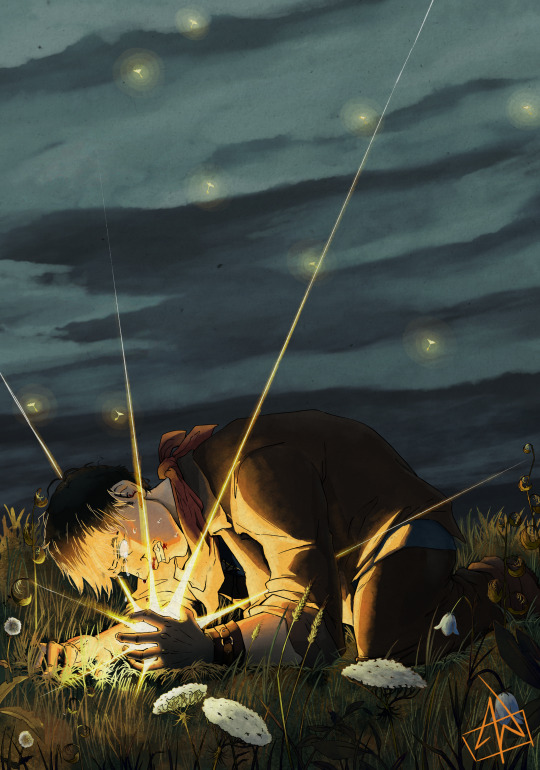
You don't know why I was born like this, do you.
No.
I'm not a monster, am I?
1K notes
·
View notes
Photo

Title: Between Three Tarts
Authors: @darkpuck, @glon-morski, KatrinaEagle (Quote Card done by @a-still-small-vox )
Fandom: Final Fantasy XV
Category: Gen
Rating: General Audiences
Characters: Noctis Lucis Caelum, Lunafreya Nox Fleuret, Loqi Tummelt
Summary: A dream is a wish your heart makes when you’re fast asleep…
OR
An enemy is just a friend you haven’t met yet.
OR
Desserts in the middle of an improbable forest with the Oracle? Seems legit.

“I don’t mean to interrupt,” he interrupted, “but do either of you know where we are or how we came to be here? This can’t possibly be Leide.”
Leide? Why would Loqi think… No, it’s likely a good thing that this Niff Commander didn’t realize they were in a dreamscape. Noctis tried to put on a politely bemused look, as if this meeting in an unknown place was not something to think too hard about.
“I try not to think too much about the hows and the whys… Especially not when Luna is involved. In any case, Leid is quite beautiful this time of the year.”
To distract them all, Noctis waved a polite hand over the table still laden with desserts. An extra chair had appeared– or had there always been three?– and quite honestly, half of Noctis’ attention had been on the ulwaat berry tarts the whole time.
“Tart?” he asked, offering the plate towards Loqi. No harm trying to make friends.
19 notes
·
View notes
Photo
I haven't posted anything in *forever*, but now I'm preking back in with a Big Bang entry LOL Hope you enjoy!
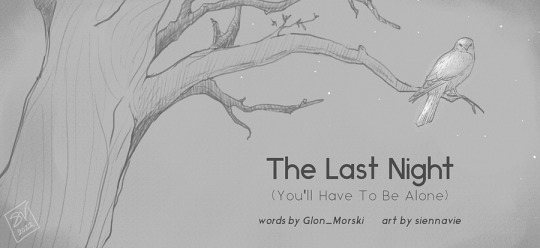


The Last Night (You’ll Have To Be Alone)
words by glon_morski, art by @siennavie
Summary: Emrys Dragongreat is an old man who has been alone for a very long time, and he likes it that way.
Arthur Goldraig is an abandoned boy barely thirteen years of age who is just desperately trying to survive on the streets.
When the two meet, it is by accident, late on a cold winter evening. For Emrys, it is a regular Tuesday. For Arthur, it is anything but.
Their meeting is brief and seemingly insignificant, but there’s something about Arthur that makes Emrys find him again and offer to take him in.
The arrangement shouldn’t change either of their lives, and Arthur doesn’t expect it to. But as time passes, things change. And before either of them know it, they both find in the other what they never thought to have again.
Click HERE for the story and HERE for the art!
#Glon's writing#BBC Merlin#After Camlann Big Bang#Gen#Arthur & Merlin#Found Family#This fic was a PAIN to tag#I swear...
28 notes
·
View notes
Link
Chapter 19 - In which Arthur is an idiot and insists on fighting a certain knight despite everyone telling him to back out.
This is going to be a long one, I can feel it…
#BBC Merlin#Glon's Writing#Waercsár-verse#Arthur Pendragon#Merlin#Uther Pendrgon#Gaius#Adult Fear#Uther may need lessons in parenting but he *does* care#long-fic#long post
34 notes
·
View notes
Text
Six Sentence Monday over here as well LOL Thank you for the tag @pathoftheranger! (And for inadvertendly introducing me to The Untamed, by the way XD I need to finish watching the Netflix series haha)
Six sentences from an upcoming WIP, right? Well then, have these six seven from the next chapter (19) of my BBC Merlin WIP, Wærcsár Tācnunge:
Was there absolutely no one Arthur could trust? Was he doomed to always be double crossed, even by those few people who had never made the enchantment react before, who’d used to not want to hurt him? Were people’s intentions really that fickle, their loyalties so easily swayed? Was he truly such a disappointment, such a weakling, that no one could bring themselves to believe in him?
Arthur didn’t want that to be true. But as far as he could currently tell, it was.
And he hated it with all his being.
Other writers to tag, hmmm... @tsukithewolf, @secret-engima (if you’re willing) and... @ginkotracks, since you’ve been writing lately ^^ If you feel up for it of course :3
It’s 6-sentence…Monday now because it’s no longer Sunday. Thanks for tagging me, @mrs-monaghansblog — ya got me! 😋🧡 (I assume this means post six sentences from a recent or upcoming fic.)
I don’t really write or do…anything with the Shameless fandom anymore, so here’s six sentences from my recent “The Untamed” one-shot, “Imparting.”
~
“Wei Wuxian,” replied Jiang Wanyin evenly and with a hint of condescension, “how noble you are not to trouble anyone with news of your wedding. How selfless to spare others the expense of gifts and travel.”
Lan Sizhui and Wen Ning exchanged a disquieted glance, but Wei Wuxian put his hands on his hips and jerked his head in Jiang Wanyin’s direction.
“Hey, you know how the Lan Clan of Gusu is. Gifts and guests?” He mock-shuddered. “I’d have to copy the rules three thousand times to atone. I’d be imprisoned here for years.”
~
(Technically, that’s seven, but I wasn’t about to cut off the quote. Sue me. [Don’t sue me. 🥺])
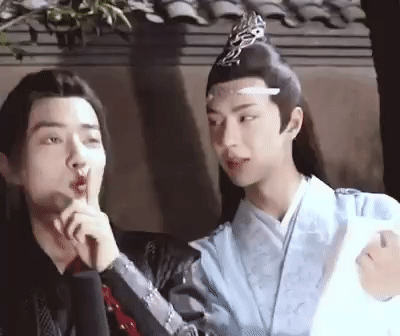
So…writers…to tag…uh…okay… @glon-morski aaaaaaaaand… @gallavictorious ? I think @magnolias-by-the-window writes, so hello, nice to meet you, and you are officially tagged if you so choose! 😃
28 notes
·
View notes
Link
Chapter 18 - In which Arthur is trying to deal with way too many thoughts and emotions at once and Merlin is confused and at the end of his rope.
This is going to be a long one, I can feel it…
34 notes
·
View notes
Link
Chapter 17 - in which a certain woman comes to Camelot and Arthur starts to behave strangely...
This is going to be a long one, I can feel it…
34 notes
·
View notes
Link
Chapter 16 - In which Merlin and Arthur ruminate
This is going to be a long one, I can feel it…
#BBC Merlin#Glon's Writing#Waercsár-verse#Arthur Pendragon#Whump#Merlin#Cavall#Yes he gets another scene#Yes I enjoy writing Arthur and Merlin interacting with the dogs#Trust me it's cute#And/or funny#Most of the time :3c
34 notes
·
View notes
Link
Chapter 15 - in which a certain physician undermines Gaius’s credibility and Merlin and Arthur both think there’s something fishy about that...
This is going to be a long one, I can feel it…
#BBC Merlin#Glon's Writing#Waerscàr-verse#S1E6 A Remedy To Cure All Ills#Canon divergent#To a degree#I swear it's in a good way#You'll love it#Merlin#Arthur Pendragon
34 notes
·
View notes
Link
Chapter 14 - in which Merlin drinks posion for Arthur and Arthur refuses to let him die...
This is going to be a long one, I can feel it…
#BBC Merlin#Glon's Writing#Waercsàr-verse#s1e4 The Poisoned Chalice#Angst#Uther is trying to teach Arthur Kingly lessons#But the way he goes about it is admittedly questionable#Merlin and Arthur meanwhile both try and fail to die for each other#Like the idiots they are
34 notes
·
View notes
Link
Chapter 13 - In which Arthur is conflicted, does a lot of thinking, and ultimately learns something he kind of wishes he didn’t find out...
This is going to be a long one, I can feel it…
#BBC Merlin#Glon's Writing#Waercsár-verse#Arthur Pendragon#Cavall#Arthur may be smart but he's also in denial
34 notes
·
View notes
Text
On Ardyn, The Crystal’s Rejection of him and the history of the Lucis Caelum line
As far as villainous backstories go, Ardyn’s has been one of the most discussed ones basically since FFXV came out. This is partly due to the fact that the game has a very obvious weakness in its storytelling, and so parts of the story, character backgrounds and even lore are obscure at best. The fact that Ardyn himself is basically the only one who tells us what happened, providing only a one-sided, biased account of the past, does not help. Bahamut may add his own two cents once Noctis is sucked into the Crystal, but while he confirms the major points, he doesn’t provide any details (that I remember).
This first account of how Ardyn came to be what he is basically amounted to him being of the Lucis Caelum line, meant to take the throne, but being supposedly usurped and/or betrayed by another. However, in Bahamut’s own version of the story, it is Ardyn who is called the Usurper, as if he had been the one in the wrong.
Then his DLC came out and a lot of retconning happened and the current stance is that he was ‘robbed of his throne’ by his brother Somnus, rejected by the Crystal for doing what he was ordained to do and overall just having been dealt a shitty, unfair hand in life, so please feel very very sorry for him. *rolls her eyes*
Yeah, I’m not gonna do that. I want to know what really happened. So I’m going to absolutely ignore Episode Ardyn (EPA) and its prologue (EPAP) because they’re not considered canon to the main game, anyway. They’re an alternate timeline and thus do not matter to me. I’m interested in canon. So that’s where I went digging.
As a TL;DR, here are my conclusions: Ardyn being rejected by the Crystal is actually his own damn fault, for two reasons. One, he did something he absolutely was not meant to do, and you can argue that it was just him being altruistic and wanting to help people and that it was the right thing and his heart was in the right place, but it doesn’t change the fact that it wasn’t what he was supposed to be doing and it ended up doing more harm than good, specifically to himself. (In case it’s not clear, I’m talking about the whole ‘healing the sick’ thing.) Two, he misunderstood pretty much everything about his so-called Calling. He wasn’t ‘chosen, then rejected’, he was rejected because he felt entitled enough to tell himself he was chosen when he was actually not. And when the Crystal put him in his place for his audacity, he got mad and threw a tantrum like a little kid.
Yes, I am telling you that Ardyn wasn’t actually betrayed by anyone other than his own ego. He was a manchild with a humongous sense of entitlement who couldn’t handle being told ‘no, you got it wrong, back off’. That’s all it is.
As for how I reached these conclusions, a whole-ass essay is under the cut. If you wish to defend Ardyn, agree with me or otherwise discuss it, please feel free so long as you fulfill two requirements:
You actually read the essay below.
You will remain polite.
Thank you.
Acknowledgments: translations from Spanish (ES) (and the original ES texts) provided by Yrathiel on Discord. The German (DE) and French (FR) versions were translated by me. All the texts are transcribed directly from the archives in the game.
I) Ardyn’s story
All right, so what made me reach those conclusions about Ardyn’s story being so vastly different from what he tells us? Well, the answer to that question is actually in the game itself, scattered throughout the datalogs (and with additional info being interestingly scattered throughout the different localizations of the game, too). Let’s start with the simple and obvious: Ardyn’s entry in the dossiers (specifically part 3 of his entries, since we’re not interested in the parts about him being Niflheim’s Chancelor):
“Though Ardyn was born to become the Founder King of Lucis, fate had other plans for him. Blessed with the power to heal those afflicted with the Starscourge, he travelled the world purging the plague from their bodies by absorbing it into his own. Yet when he stood before the Crystal for judgment, it deemed him unworthy of becoming its chosen champion, decrying him as impure of heart. Ardyn was cast into exile, shunned by the people who once adored him and condemned by his own flesh and blood. He now seeks revenge on the Lucian bloodline -- in particular, on the ‘True King’ chosen to serve as the Crystal’s champion: Noctis Lucis Caelum.”
What’s interesting to note here, despite the sometimes confusing syntax (in terms of what it tried to imply), is the word choice in the important parts. ‘Ardyn was born to become the Founder King’, not chosen for it. This implies that, if not an official monarchy, a line of succession was already in place and the only thing that made him the one meant to be next in line and apparently becoming the first proper King was his blood. His birthright. He then sought the Crystal’s judgment, but was unworthy of becoming ‘its champion’. However, ‘the Crystal’s champion’ is not the Founder King, it’s the True King, the role Noctis was chosen for. What this means is that Ardyn’s Calling, job or whatever you want to call it never had anything to do with being chosen by the Crystal. He was never a Chosen of any kind. He was born a future ruler and meant to be the Founder King - the first King - of Lucis, but no part of this entry ever says anything about the Crystal being involved.
However, his bestiary entry contradicts that a little bit; it still confirms more than it contradicts, though:
“The man who was to be the first King of Lucis. Assuming the burden of the Starscourge corrupted the Chosen’s body, causing the Crystal to deny his ascendance to the throne. Ardyn’s impurities grant him eternal life, which he spends plotting his revenge upon the blood royal and the True King.”
So, apparently he was called a Chosen. Not just born to rule, Chosen. But here’s the question: chosen by who or what? We have no indication of that here. And interestingly, this is the only time in the archives (and in the game as a whole if memory serves, outside of Ardyn’s own, self-absorbed, entitled dialogue) that he’s ever called a ‘chosen’. So chances are it’s not the same kind of ‘being chosen’ as Noctis and other languages confirm this.
FR
”Ardyn should have once become the very first King of Lucis. He was a good, altruistic man whose organism was capable of absorbing the parasites which were the origins of the Ill of the planet [=Starscourge] and the daemons, which allowed him to save countless lives, but also to gain immortality. Unfortunately, his defiled body was rejected by the Crystal and Ardyn was stripped of his royal status, banished and removed from history. Thus, he did everything to take vengeance on his family, casting the entire world into darkness and ensuring that Noctis would obtain the power of the Crystal in order to eliminate him as the king of light.”
“This man should have been the first King of Lucis. The Crystal refused him this privilege after Ardyn was tainted by the Ill of the Planet. This change, however, granted him eternal life. An unlimited amount of time which he uses to construct his machiavellian revenge against the genuine royal family.”
(For those who don’t know, as I had to look it up myself: ‘machiavellian’ means ‘cunning, scheming, and unscrupulous, especially in politics’)
FR - Original
“Ardyn aurait dû devenir autrefois le tout premier Roi de Lucis. C’était un homme bon et altruiste don’t l’organisme était capable d’absorber les parasites à l’origine du Mal de la planète et des daemons, ce qui lui a permis de sauver d’innombrables vies, mais aussi d’acquérir l’immortalité. Malheureusement, son corps souillé a été rejeté par le cristal, et Ardyn a été dépouillé de sa royauté, banni, et effacé de l’Histoire. Il a alors tout mis en œuvre pour se venger de sa famille, plongeant le monde entier dans les ténèbres et faisant en sorte que Noctis obtienne le pouvoir du cristal dans le but de l’éliminer en tant que roi de la lumière.”
“Cet homme aurait dû être le premier roi de Lucis. Le cristal lui a refusé ce privilège après qu’Ardyn ait été corrompu par le Mal de la planète. Cette altération lui a néanmoins offert la vie éternelle. Une durée illimitée qu’il utilise pour échafauder sa machiavélique vengeance contre la véritable famille royale.”
DE
“As the first born of the Izunia family, which was once chosen as the line of Lucis Caelum due to its special abilities, he should have become the first King to protect the Crystal. Yet he used his powers to cure the people afflicted by the Astral Plague [=Starscourge] by absorbing the parasites of darkness into himself. As a result, he was rejected by the Crystal, attacked by his brother and ultimately banned into exile. Since then, the darkness has taken hold of him more and more and the hatred towards the Crystal and the line of kings is his only motivator. His true objective is to eliminate the chosen king after the powers of the Crystal and his ancestors were combined within him.”
“Ardyn was chosen to become the first King of Lucis, but the Crystal denied him this honor after he came in contact with Scourge-infected cells. Having become immortal through the absorption of the Scourge-infected cells, Ardyn’s hatred towards the royal family continued to grow. His deepest desire to one day take his revenge on the Chosen King.”
(Translation note: ‘Scourge-infected cells’ is the translation I decided to use for ‘Siecherzellen’, which is a combined word of ‘siech’ and ‘Zellen’, the latter meaning ‘cells’. ‘Siech’ is a formal and slightly archaic word that implies ‘long-time sick and weak (from age), without any serious hope of recovery’, and can be translated as ‘infirm’, but I decided to go with a less literal translation due to context.)
DE - Original
“Als Erstgeborener der Familie Izunia, die einst für ihre besondere Fähigkeiten zur Linie der Lucis Caelums erwählt wurde, hätte er der erste König zum Schutze des Kristalls werden sollen. Doch er nutzte seine Kräfte, um die von der Astralplage befallenen Menschen zu heilen, indem er die Parasiten der Finsternis selbst in sich aufnahm. Daraufhin wurde er vom Kristall verstoßen, von seinem Bruder angegriffen und schließlich ins Exil verbannt. Seitdem hat die Dunkelheit immer mehr besitz von ihm ergriffen und der Hass auf den Kristall und die Linie der Könige ist sein einziger Antrieb. Sein wahres Ziel ist es, den erwählten König zu vernichten, nachdem dieser die Macht des Kristalls und seiner Ahnen in sich vereint hat.”
“Ardyn war dazu auserkoren, der erste König von Lucis zu werden, doch nachdem er in Berührung mit Siecherzellen gekommen war, wurde ihm diese Ehre vom Kristall verwehrt. Durch die Aufnahme der Siecherzellen unsterblich geworden, wuchs Ardyns Hass gegen das Königsgeschlecht weiter. Es ist sein innigster Wunsch, sich eines Tages am erwählten König zu rächen.”)
ES
“Ardyn was born to rule over Lucis as its original and founder King, but destiny had other plans for him. He received a holy power that permitted him to heal victims of the Scourge, the calamity of the stars, and travelled over all Eos to purge the sickened of their maladies and to absorb the plague into his body, infecting himself. When he finally presented himself to the crystal to receive its gifts, he was repudiated without expecting it due to having impurities in his heart. He was exiled and scorned by those that adored him before, and even his own family turned their backs to him. Ardyn's objective is to unload his ire against the heirs of Lucis and especially to obtain his revenge against the 'throned one', favoured by the crystal: Noctis Lucis Caelum.”
“His destiny was to become the Founder King of Lucis and the Chosen of the Crystal, but his dirty soul was repudiated by it and he never was able to become a monarch. He turned immortal after assimilating the Scourge and his objective is to defeat the 'throned one' for the Crystal to suffocate the hate he has accumulated.”
ES - Original
“Ardyn nació para reinar sobre Lucis como rey primigenio y fundador, pero el destino tenía otros planes guardados para él. Recibió un poder bendito con el que podía curar a las víctimas de la estepatía, la calamidad de las estrellas, y viajó por todo Eos para purgar a los aquejados de sus males y absorber la plaga contagiándosela a sí mismo. Cuando finalmente se presentó ante la Santálita para recibir sus dones, fue repudiado ante todo pronóstico pues albergaba impureza en su corazón. Fue desterrado al exilio y menospreciado por aquellos que en su momento le adoraban y hasta su propia familia le dio la espalda. Su objetivo es descargar su ira contra los herederos de Lucis, y en particular, vengarse del Entronado, favorecido por el Cristal: Noctis Lucis Caelum.”
“En su destino estaba ser el rey fundador de Lucis y el elegido por la Santálita, pero su sucia alma fue repudiada por esta y jamás consiguió convertirse en monarca. Se volvió inmortal tras asimilar la estepatía y para sofocar el odio acumulado se dispone a derrotar al Entronado por el Cristal.”
Notable differences and similarities between the versions:
English and Spanish are the only versions to claim Ardyn’s healing powers were in any way related to the gods (being ‘divine’, or that he was ‘blessed’). The other versions acknowledge his abilities, but don’t provide any sort of insight of where they came from. They’re just there, his, and that’s it.
German is the only version to claim the Izunia family was chosen as the ‘Lucis Caelum line’ due to the abilities people of the family had long before Ardyn was appointed King.
All versions agree Ardyn was meant to be the Founder King, but German alone directly states he’d be ‘the first king to protect the Crystal’.
Spanish is the only version that outright states Ardyn was the Crystal’s chosen. He’s not deemed chosen by the Crystal in any other version. Though he’s said to have been ‘chosen’ in English, it’s never stated it was the Crystal that did the choosing.
French is the only entry to claim Ardyn was actually removed from history, or that he was a ‘good and altruistic’ man.
German, English and Spanish all insist on the fact that Ardyn was born with the right to the throne.
All versions agree Ardyn was rejected by the Crystal due to being defiled by the Scourge. Spanish and English further insist on an impurity of heart (and soul in ES), but also present the whole rejection as a matter of ‘fate’ or ‘destiny’. Meanwhile, the German phrasing paints Ardyn’s journeys to save the people as something he was not supposed to do, something he did instead of the job assigned to him, i.e. being King. EN phrasing, on the other hand, seems to try to imply that Ardyn healing the sick should have made the Crystal accept him, yet instead it rejected him for his ‘impure heart’. French insists on how his actions saved innumerable lives and paints his rejection as something of an ‘unfortunate circumstance’ or a ‘regrettable turn of events’ more than anything else.
So, looking at all this, we have a pretty strong case for two facts being certain facts: that Ardyn’s ascension to the throne was his birthright and that the main reason for the Crystal rejecting him was the Scourge. The question of him being ‘chosen’ is harder to answer with just this, considering the inconsistencies between the different versions, and sometimes even within one localization (looking at you, EN). However, it seems safe to assume that even if he had been chosen, it was not by the Crystal. So that begs the question of who or what could have possibly chosen him, and for what exactly if he was already meant to be King by birthright and blood line?
Well, there’s this particular detail in the German version stating Ardyn would be ‘the first King to safeguard the Crystal’. We also know the Astrals expected the Lucis Caelum line to safeguard the Crystal. It was basically their calling. Does that mean Ardyn was the one bequeathed the Crystal by the Astrals? This seems to be the general (fan) consensus; or at least that Bahamut bequeathed the Crystal onto the Lucis Caelum line in the time of Somnus and Ardyn and that they didn’t have it before. This fact is contradicted by EPAP, but we’ve already established that EPAP is not part of the canon continuity, so we can disregard that little issue.
However, the fact that this same version of the entry also states the Izunia family had been chosen to be the Lucis Caelums before would contradict that assumption better than EPAP anyway. Because the Lucis Caelum line was founded when Bahamut gave them the Crystal and the Ring, officially making them royals and naming them Kings. Right? And yet Ardyn is the ‘first King to protect the Crystal’? When the title of ‘Lucis Caelum’ had already been bequeathed? Something seems fishy here. Let’s take a look at the Cosmogony.
II) The Crystal and The Ring of the Lucii
(All translated entries are immediately followed by their original texts from here on out.)
Cosmogony entry - The Crystal.
EN
“There once lived a man, born mortal, but blessed with powers divine. Conjuring a collection of glaives, he dispelled the darkness plaguing our star. As a reward for his efforts, the gods granted him a holy stone - the Crystal, which he was to guard at all costs. For it would one day choose a King to see us through the coming disaster and lead us to salvation.”
FR
“There was once a man with extraordinary powers. He could use multiple arms with ease and he fought the darkness that threatened to swallow the planet. Impressed by his bravery, the Six presented him with a holy stone and ordered him to protect it, for it was destined to choose the King who would save the world.”
“Il y avait autrefois un homme au pouvoir extraordinaires. Il pouvait utiliser plusieurs armes avec aisance et il combattit les ténèbres qui menacèrent d’engloutir la planète. Impressionnés par sa vaillance, les Six lui remirent une pierre sacré et lui ordonnèrent de la protéger, car elle était destinée à choisir le Roi qui sauverait le monde.”
DE
“Even among mortals, there was one who had great powers. With his powerful blades, he stood against the darkness. One day, the Six entrusted him with a Crystal to protect. In the time of the greatest plight, they said, it would choose a King who would save mankind.”
“Auch unter den Sterblichen gab es einen, der über große Kräfte verfügte. Mit seinen mächtigen Klingen stellte er sich der Dunkelheit entgegen. Eines Tages vermachten die göttlichen Sechs ihm einen Kristall zum Schutze. In größter Not, so sagten sie, würde dieser einen König erwählen, den Menschen Rettung zu bringen.”
ES
“A long time ago, there was a man that, even having mortal blood, was blessed with divine powers. He wielded weapons that he summoned from nothing with the power of his will, and with them he banished the darkness of our world. He received a holy/blessed Crystal from the Astrals, and also the duty of safekeeping it at any price, since it would choose the 'throned one', who would grant the world its salvation.”
“Érase una vez un hombre que, a pesar de tener sangre mortal, fue bendecido con sus poderes divinos. Blandió armas que conjuraba de la nada según su voluntad y con ellas desterró la oscura calígine de nuestro mundo. Recibió de los Sidéreos un cristal sagrado, la Santálita, y el cometido de velarlo a cualquier precio, pues su gracia habría de elegir al Entronado por cuya mano alcanzaría el mundo la salvación.”
It is interesting to note that only EN and ES mention the powers that were ‘divine’ in nature or say that he could conjure blades from nothing. DE and FR meanwhile merely state the man had extraordinary prowess, particularly in combat. Furthermore, what made the Astrals bestow the Crystal on him weren’t those same powers, but merely his bravery and the fact that he fought back the darkness - likely referencing the Scourge. That said, there’s no mention of any ability to heal, which would be the most obvious indicator that the man was, indeed, Ardyn. It might be. But it might also be Somnus… or an ancestor of theirs.
Furthermore, there’s an important detail to note that coincides across all versions - namely that the only mention of a ‘King’ of any kind in this entry is the allusion of the Chosen King who will be chosen by the Crystal and save Eos. The man who was entrusted the Crystal’s protection was not named King. He was merely the protector of the Crystal. This would mean that when the Izunia family was granted the Crystal and the name/title Lucis Caelum by the Astrals, they were merely chosen as protectors of the Crystal, nothing more. Moving on…
Cosmogony entry - The Ring
EN
“Before falling into eternal slumber, the Six bequeathed unto man one last treasure: a ring. Yet who among us was fit to possess this gift of the Gods? After some time, the ring was transferred to the hands of a man blessed with powers divine, ultimately developing the mark of one fit to rule.”
FR
“Before falling into a long sleep, the Six offered mortals a ring. These mortals then decided that it should belong to the one among them who had the greatest powers. And thus the ring became the symbol of rightful kings.”
“Avant de sombrer dans un long sommeil, les Six offrent un anneau aux mortels. Ces derniers décidèrent qu’il devait revenir à celui qui, parmi eux, possédait le plus grand pouvoir. C’est ainsi que l’anneau devint le symbole des rois légitimes.”
DE
“Before the Six fell back into their slumber, they left mankind a ring with magical powers. Only the most worthy would be capable of wearing it, or so it was said. And so, as the years passed, the ring became the symbol of Kings.”
“Bevor die Sechs zurück in ihrem Schlummer fielen, hinterließen sie den Menschen einen Ring mit magischen Kräften. Nur der Würdigste wäre in der Lage ihn zu tragen, so hieß es. Und so wurde der Ring mit den Jahren zum Zeichen der Könige.”
ES
“Before succumbing to their long sleep, the astrals left behind a ring. This ring, being a boon for humanity granted by the gods, would only be wielded by one worthy of the astrals. This ring, the ring of light, would then become a symbol and the proof of the true king.”
“Antes de sucumbir a su largo sueño, los Sidéreos dejaron tras de sí un anillo. Al ser un don otorgado a la humanidad por los dioses, solo aquel que fuera digno de los Sidéreos habría de portarlo. Se convirtió así este anillo, el Sello de la Luz, en símbolo y fe del verdadero rey.”
Huh, would you look at that. This actually answers a lot, doesn’t it. We have our mentions of Kings and people being chosen to be kings - namely those who were ‘worthy’ or ‘the most powerful’ (depending on the version). ES is the only one that’s more specific than the others by saying the Ring became the symbol of the ‘true king’. Meanwhile, EN is the only version that mentions the ring ending up in the hands of a ‘man with powers divine’ similar to the entry about the Crystal. Furthermore, the Astrals gave that ring ‘before falling into slumber’ (or ‘back into it’ in DE), which would mean this happened (right) after the Astral war.
This is further enforced in Bahamut’s bestiary entry.
EN
“God of War. The Draconian’s bonds to the Lucii run deepest among the Six. At the end of the Astral War, when Ifrit had fallen and civilization lay in ruins, the Bladekeeper alone held vigil awaiting the coming of the Chosen King, while the other gods lay dormant.”
FR
“God of War. The Draconian is the most attached to the future of Lucis. At the end of the Astral War, when Ifrit had disappeared and civilization lay in ruins, Bahamut remained, alone, waiting patiently for the arrival of the Chosen King.”
“Dieu de la Guerre. Le Draconéen est la divinité la plus attaché au devenir du Lucis. A la fin de la guerre divine, alors qu’Ifrit avait disparu et la civilization était en ruine, Bahamut est resté, seul, à attendre patiemment l’arrivé du roi élu.”
DE
“The God of Swords. Once he watched over Eos as part of the Six. He shares a particularly close relation to the Kings of Lucis. He was the only deity who didn’t fall into slumber after the Astral War and the destruction of Ifrit. He waited patiently for the birth of the Chosen King, whom he intends to help with the fulfillment of his destiny.”
“Gott der Schwerter. Einst wachte er als Teil der göttlichen Sechs über Eos. Zu den Königen von Lucis eint ihn eine besonders enge Verbindung. Er was die einzige Gottheit, die nach dem Astralkrieg und der Vernichtung Ifrits nicht in Schlaf verfiel. Geduldig harrte er der Geburt des erwählten Königs, dem er bei der Erfüllung seines Schicksals zu helfen bedenkt.”
ES
“The Astral of Steel, one of the Six that sustain Eos since time immemorial. It is said that he's the Astral that keeps a closer relation with the House of Lucis. After the fall of Ifrit and the loss of the ancient civilization in the Astral War, he was the only Astral to not succumb to sleep. He awaited the awakening of the 'throned one' (chosen one) and the fulfilment of his mission.”
“El Sidéreo del Acero, uno de los seis pilares que sostienen Eos desde tiempos inmemoriales. Se dice que es el Sidéreo que guarda una relación mas estrecha con la Casa de Lucis. Tras la caída de Ifrit y la pérdida de la civilización antigua con la Guerra Infausta, fue el único de los Sidéreos que no se entregó al sueño. Aguarda el despertar del Entronado y el cumplimiento de su misión.”
These entries, across all here compared versions, not only name-drop the Astral War, but also all agree on the fact that Bahamut ‘patiently waited for the arrival of the Chosen King’. Meaning that by the time of the Astral War, the prophecy was something he knew well and it was likely the same for humanity as a whole. This would only be possible if the Crystal, and the seeds sowing the knowledge of the prophecy shown in the Cosmogony entry about the Crystal, had already been entrusted to the line of Lucis Caelum/Izunia. Had Bahamut still needed to entrust the Crystal to someone and sow those seeds, I believe he wouldn’t have been said to have just ‘waited’, but that he ‘ensured humanity knew of the prophecy’ or something of that nature. Generally speaking, if the Crystal wasn’t yet in the possession of humans at this time, his entry would at least imply a more active involvement than just ‘patiently waiting.’
Furthermore, this entry confirms beyond the shadow of a doubt that the Astrals fell into their slumber right after the Astral War and, as far as we know, they never woke from it until the events of the game. This is yet another indication that they had to have given their ‘chosen protector’ the Crystal before that war. Finally, it’s important to note that the ring wasn’t given to any specific human in any version of the Cosmogony entries reviewed here, but on humankind as a whole and it was humans who decided who should get it and eventually made the ring into a symbol of a ‘rightful king’ or a ‘royal line’.
The only real discrepancy here is the one over a ‘man (blessed) with powers divine’ (which makes it sound like the powers of the line of Lucis Caelums were god-given) in EN and ES, while said man is only said to have ‘extraordinary power’ without any connections to the Astrals in FR and DE.
For this last one, there’s this interesting entry we can look at in the game’s lore guide:
Magic of the Lucii (I + II)
EN
“The Crystal is the divine cornerstone of the Kingdom of Lucis. The stone has a will of its own and channels its power through the Ring of the Lucii to the monarch who bears it. Monarchs of the Line of Lucis have the innate ability to conjure magical weapons. A handful of close attendants is also afforded this self-same power.”
FR
“The Kingdom of Lucis possesses a sacred rock with mystical powers called the Crystal. Only the King who has the Ring of the Lucii at his disposal can borrow the might of the Crystal. The members of the royal family inherit a power which allows them to summon weapons. The King may also lend this power to a small part of his closest followers.”
“Le royaume de Lucis possède une pierre sacrée aux pouvoirs mystiques appelée le cristal. Seul le Roi doté de l’anneau de Lucis peut emprunter la force du cristal. Les membres de la famille royale héritent d’un pouvoir qui leur permet d’invoquer des armes. Le roi peut également prêter ce pouvoir à une petite partie de ses suivants les plus proches.”
DE
“The House of Lucis protects the sacred Crystal of Eos. Only the King with the Ring of the Lucii may cast spells which are superior to any weapon. The members of the royal family are capable of summoning weapons thanks to the magic of the Crystal. They may even share these powers with their closest confidants.”
“Das Haus von Lucis bewacht das heilige Kristall von Eos. Nur der König vermag, mit dem Ring der Lucis, Zauber zu entfesseln, die jeder Waffe überlegen sind. Die Mitglieder der Königsfamilie sind dank der Magie des Kristalls dazu in der Lage, Waffen zu beschwören. Diese Kräfte können sie sogar mit ihren engsten Vertrauten teilen.”
ES
“Every descendant of the Lords of Lucis, the glorious kings of yore, inherits the power to use the armiger, the weapons arsenal that their royal ancestors used while alive.
Moreover, with the ring of light, a ring where the souls of said ancestors live, they are able to release demolishing arcane spells.
The kingdom of lucis holds the Crystal, the only blessed Crystal in all Eos. Only its Kings receive the gift and the power of the holy Crystal, because only if they're deemed worthy can they wield the ring of light, that acts like a channel for the mystical power of the crystal”
“Todo descendiente de los Señores de Lucis, los gloriosos reyes de antaño, hereda el poder de manejar a voluntad el Coro espectral, el arsenal de armas que blandieron en vida sus ancestros reales.
Además, cuentan con el Sello de la Luz, un anillo donde moran las almas de estos antepasados, capaz de liberar conjuros arcanos demoledores.
El Reino de Lucis hospeda la Santálita, el único cristal sagrado de Eos. Solo sus reyes reciben la bendición y el poder del venerado Cristal, pues solo si son dignos pueden portar el Sello de la Luz, que actúa como canalizador del poder místico de la Santálita.”
So… virtually all versions except German agree that the power to invoke weapons, the armiger, is not connected to the Crystal. It’s an innate power of the Lucis Caelums, something they’ve always had, independently of the Crystal. This makes sense considering the earlier quoted Cosmogony entries also hardly make any actual connection between these powers and the Astrals. In fact, it’s possible that even in the versions where the powers of the Lucis Caelums are called ‘divine’, it’s meant more as ‘god-like’, rather than ‘god-given’. By contrast, in a different entry of the lore guide (not quoted here), the Oracle’s powers to heal are outright stated to have been granted to her line by the Astrals.
Taken together, these excerpts would then constitute the following sequence of events:
In antiquity, the time of Solheim, a darkness surges and a man with extraordinary (god-like) powers drives it back. Impressed by his deeds, the Six entrust him with the protection of the Crystal and sow the seeds of the prophecy of the Chosen King. The line of Lucis Caelum is founded from the Izunia family.
At the end of the Astral War, the Six give the surviving humanity the Ring before falling asleep. Humans then decide only the most powerful and/or worthy of them should have the right to wear it and use its power. In time, the ring ends up in the hands of the Izunia family/Lucis Caelum line. As time passes, humans begin to associate the Ring with the symbol of ‘rightful kings’.
In the time of Ardyn and Somnus, the Izunia family/Lucis Caelum line is well established and knows its god-given duties well. As the first born, Ardyn is meant to be the next in line to protect the Crystal, which is known (by Ardyn and his family, not necessarily the rest of the world) to one day choose a King who will save the world. He’s also likely to inherit/obtain the Ring, which by then has gained the ‘Symbol of Kings’ moniker. Hence, Ardyn is expected to take the throne and become the very first King of Lucis. It is his birthright as much as he’s chosen for it. But he’s chosen not by the Astrals or the Crystal, but by humanity, by his fellow man, who were the ones to make the Ring into a symbol of kings in the first place.
The Scourge grows into a pandemic. People are dying. There is no cure. It is, it would seem, the time of ‘greatest need/plight’. People need a savior and the Crystal is destined to appoint that savior, the Chosen King. Ardyn already has been chosen to be king, though before sitting the throne, he goes out into the world and tries to heal as many as he can with his exceptional healing ability (not given to him by the Astrals as far as we can tell). In that situation, being put in the position of becoming the first King of Lucis and having proven himself capable and willing to save the people and fight back the Scourge, Ardyn grows to believe he’s not meant to be just the Founder King, but the Chosen King. So he goes to the Crystal he’s meant to protect to get the confirmation of that, because surely there is no one else… and is subsequently rejected due to being defiled by the very blight he was curing others from.
And this basically sums up what the Cosmogony and Ardyn’s archive entries would allow us to put together about his backstory. We could stop here. It shows what happened pretty well already, right?
Well, sorta, but there’s still the question of what happened after Ardyn was rejected. We know he was banished by Somnus and Somnus took his place, but exactly what led to it? Just his rejection? Somnus being an opportunistic, jealous ass and wanting the throne for himself? Or maybe was there something more? And how can I so easily assume that Ardyn being chosen as King by his people got to his head like that?
Well… let’s look at a couple more entries, shall we? Try to get a bit more context, particularly since the aforementioned possible sequence of events implies not one, but two resurgences of ‘darkness’ (which may or may not be the Scourge in both cases) before the events of the game.
III) Astral War, Scourge and Somnus’s Deeds
So, it’s a well established fact in the FFXV lore that the Astral War was the main reason Solheim fell and that it began because the people of Solheim rose up against Ifrit, who then wanted to destroy them (and Eos as a whole) and the other Astrals stepped in. So why bring this up? It’s not exactly a point of contention.
Well, this might not be, but there’s an interesting tidbit in Ifrit’s bestiary entry that I believe warrants being taken into account.
EN
“God of Fire. It was the Infernian who bestowed the gift of fire on man in antiquity. He reigned over the ancient kingdom of Solheim until his once-loyal subjects turned against him. The Pyreburner then waged the Astral War that would quench his own life’s flame until his own daemonic resurrection by means of the Scourge.”
FR
“God of Fire. It was thanks to the gift of the Scorcher that humans today have mastery of this element. Ifrit reigned over the ancient Kingdom of Solheim until his subjects rebelled against him. This revolt would set off the Godly War, which would end with the destruction of the Scorcher. It’s the Ill of the Planet that provoked the infernal resurrection of this deity.”
“Dieu du Feu. C’était grâce au don du Calcinateur que les hommes aujourd’hui ont la maîtrise de cet élément. Ifrit a régné sur l’ancestral royaume de Solheim jusqu’à ce que ses sujets se rebellent contre lui. Cette révolte déclencha la Guerre divine, qui se termina par la destruction du Calcinateur. C’est le Mal de la planète qui a provoqué l’infernale résurrection de cette divinité.”
DE
“God of Fire. He once watched over Eos as part of the Six. He loved humans and stirred up their thirst for knowledge. In this way, he helped the civilization of Solheim to bloom as its King. But drunk on their power, the humans turned against the Gods. In the Astral War which broke out as a result, Ifrit was defeated and later infected with the Scourge parasite. He’s endured being devoured by the darkness ever since, not just on the outside, but on the inside as well.”
“Gott des Feuers. Einst wachte er als Teil der göttlichen Sechs über Eos. Er liebte die Menschen und schürte ihnen Wissensdurst. Auf diese Weise verhalf er der Zivilisation Solheim als ihr König zu großer Blüte. Doch trunken von ihrer Macht wandten sich die Menschen gegen die Götter. Im daraufhin entflammenden Astralkrieg wurde Ifrit bezwungen und später mit dem Siecher-Parasit infiziert. Nicht nur äußerlich, sondern auch innerlich, ist er seitdem von der Dunkelheit zerfressen.”
ES
“The Astral of fire, one of the six pillars that sustain Eos since time immemorial. He gave the secret of fire away and was king of the ancient civilization of Solheim. He fell after the astral war and after being infected by the scourge, he came back to life in a state similar to daemons. Not only his body, but also his soul lies in the claws of darkness.”
“El Sidéreo de Fuego, uno de los seis pilares que sostienen Eos desde tiempos inmemoriales. Entregó el secreto del fuego y se convirtió en el rey de la civilización antigua, Solheim. Cayó tras la Guerra Infausta y tras padecer la estepatía, volvió a la vida en un estado cercano al de los cadentes. No solo su cuerpo, también su alma padece en garras de la oscuridad.”
All of these versions agree on a very important detail, namely that Solheim’s King was Ifrit himself. Not a human. Ifrit. A literal deity. And then the Astral War happened and civilization was virtually destroyed (see Bahamut’s entries quoted above). After a calamity like that, how long would it take humanity to recover enough to move past living in a tribal-like setting? How long until there were cities again and culture and a civilization that demanded a structure like a monarchy or something similar? Humanity was basically set all the way back to the beginning and had to start from scratch. Obviously, that would take time.
And then in Ardyn’s time, he’s chosen to be King. The first King of Lucis, yes… but possibly also the first human King in general. Because the only other King known to man before had been Ifrit, a deity. Please show me a man who wouldn’t get a bit of a big head when he was suddenly granted this kind of privilege. It’s not too hard to imagine it inflated his sense of entitlement from there and, since he was to be the first human King and that he had the power to save people from the Scourge, that he was the prophesied Chosen King who would save the world. And the Chosen King was to be anointed by the Crystal, which Ardyn was meant to be the next protector of, so that would track, too, if one assumed the Chosen King had to be from the line already tasked with protecting the Crystal; which, for the record, has never been said in the prophecy at all. It’s a detail that is entirely a human construct, born from the fact that the Crystal that shall choose the Chosen King and the Ring meant to be worn by the worthy both ended up, independently, in the possession of one and the same family line and that the Ring had been made by the humans to a ‘Symbol of rightful Kings’.
So of course, Ardyn would then go to the Crystal, so the obvious would be proven correct. Except he was wrong and he was rejected. From the beginning, it was all in his head. He was chosen to be the first king by his people, yes, but he was never the Chosen King of prophecy.
So… where is Somnus in all this? How did Ardyn being rejected due to his own delusions of grandeur lead to Somnus attacking and exiling him to become King instead? At first glance, it would seem there’s absolutely no way to find out in the game. Even the bestiary entry of the Mystic doesn’t touch that issue with a ten foot pole. All it mentions, across most versions, is what we already know: that Somnus became Founder King, lead Lucis to prosperity and unity for all except his elder brother, who was cast into exile. So that doesn’t give us any answers because, so far, Ardyn’s actions (that we can guess from the provided material) don’t seem to constitute any reason to go quite that far. Yes, he had delusions of grandeur, he made a mistake, but he was put in his place and told, under no uncertain terms, that being infected with the Scourge is not a good thing. Why would that warrant being attacked and ultimately exiled?
Well, to answer that, we might have to look at one of the most confusing Cosmogony entries: 15:2 Nadir. Here we go.
EN
“O’er rotted soil, under blighted sky,
A wicked plague the Wicked has wrought.
In the light of the Gods, Sword-sworn at his side,
‘Gainst the dark the King’s battle is fought.
From the Heavens’ high, to the blessed Below,
Shines the beam of peace long besought.
‘Long live thy Line and this Stone divine,
For the Night when all comes to Naught.”
So, at first glance, this seems rather unrelated, doesn’t it. It seems more an extract of prophecy, specifically the prophecy of the Chosen King, something that lies in the future from the perspective of whoever wrote this. The ‘plague wrought by the Wicked’ is the Scourge and how Ardyn unleashed it on Eos, the ‘King with the Gods Sword-sworn at his side’ would be the Chosen King, he fights against the Dark, he’ll bring ‘long besought peace’, there’s mention of a ‘Night when all comes to Naught’, which likely means the eternal night Ardyn brought about... all of this fits what we saw in the World of Ruin and the end of the game in general.
Except… no other version agrees.
FR
“Evil corrupts the air and ravages the land. At the side of the Gods, a king and his knight fight bravely. Blessed by godly light, they push back the darkness. Mortals pray for durable peace. ‘Long live Your Line and the Stone divine, the only ramparts against the night to come.’”
“Le Mal corrompt l’air et ravage la terre. Aux côtés des Dieux, un roi et son chevalier combattent vaillamment. Bénis d’une lumière divine, ils repoussent les ténèbres. Les mortels prient alors pour une paix durable. ‘Longue vie à Ta Lignée et à la Pierre sacré, seul remparts contre la nuit à venir.’”
DE
“And in his greed for revenge, he called forth the darkness which overran the skies and overflowed the world. But the King and the knight took up arms and pushed the darkness back. And the sky split and bathed the King in its light. ‘Protect the Crystal in the future and be armed for unspeakable pain.’”
“Und in seiner Gier nach Rache rief er die Finsternis, die da überfiel den Himmel und überflutete die Welt. Doch König und Ritter ergriffen die Schwerter und trieben zurück die Dunkelheit. Und es teilte sich der Himmel und badete den König in seinem Licht. ‘Schütze fürder den Kristall und sei gewappnet für unsägliche Pein.’”
ES (note: this translation is very liberal because Yrathiel struggled with understanding the rather archaic text.)
“coming from the scourge, of vile origins. decimated the earth, heaven all discolored. saviours/servants around and under the shine of the astrals. something about a gift of makers to kings. Then it would become an union long awaited. worthy ones take your scared stones and wait, because hell will open.”
“Venidos los Óprobos, de vitanda plaga orígenes.
Inferaz la tierra, macilento doquier el etéreo.
Servadores en torno y so fulgor de los Sidéreos,
cierra a aceros el Entronado con hórrida calígine.
Agraciose corusco don de Hacedores a Regentes.
Así otrora deviniere en concordia largo anhelada.
'Valedores sed para aquestas piedras sagradas.
Y Guardaos, pues el báratro se abrirá indolente'.”
Furthermore, there’s something interesting to note about the title of this entry. In FR, there isn’t one, it’s just ‘Cosmogony 15:2’. In DE, it’s completely different: ‘Of Gods and Kings’. And in EN, it’s ‘Nadir’, which means ‘the worst moment, or the moment of least hope and least achievement’ or ‘the point at which something is at its lowest value or level’. For something that, at first glance, speaks of the prophesied coming of the Chosen King who will save the world, these titles seem a bit weird. Which is why, setting aside the ES version for the simple fact that I didn’t get a proper translation (if anyone else can manage a better one, I’m all ears) there’s only one conclusion I can come to: that this isn’t really about Noct or the Chosen King. It doesn’t seem to be in at least half the versions. In fact, ES is the only version to name drop ‘the enthroned one’ (Chosen King), as you can check in the original text (‘Eltronado’ would be the word you’re looking for). All the others just mention a king and FR and DE even agree it’s ‘a king and his knight’. So two people. Now who does this sound like?
Somnus and Gilgamesh. Gilgamesh who was a knight and meant to be the first Shield of the King, but in Episode Gladiolus reveals he betrayed said king or something along those lines. However, we know Somnus still ruled just fine. So the question is, did Gilgamesh mean he betrayed Somnus at a later date… or that he betrayed Ardyn after the Crystal rejected him? If it’s the latter, why would he? What’s in it for him if Somnus exiles and/or kills his elder brother and ascends the throne? He would still be Shield to the King as far as we know. Why side with Somnus and not Ardyn if it’s all about Somnus being an opportunistic asshole who pounces the moment his brother is rejected by the Crystal for seemingly no reason?
Let’s take a closer look at all those versions (again, mostly excluding ES because of translation issues). All of them refer in some way to a plague - the Scourge. FR leaves it vague. EN and DE call out Ardyn for being the cause more or less directly. EN and FR then proceed to mention a king (and his knight in FR) who fought back, with the help of the Astrals (EN) or their godly light (FR). DE leaves the gods and their light out entirely here and only says a king and his knight fought back. The ‘divine light’ in this version comes from the sky after the battle, as it does in EN. Then it mentions the people praying for ‘lasting peace’. And finally, the quote, which seems to come from the skies in all versions, i.e. possibly from the Astrals themselves. And in all versions, it amounts to a hope that the king’s line will continue and he’ll safeguard the stone until ‘The Night’ comes.
The Night would have to be the eternal night, which the Chosen King shall end. But it’s only really alluded to as such at the very end of the entry/poem. Not to mention that the Chosen King, as we know, is meant to die, so why would anyone wish him or his line a long life after the fact? Or the Crystal, for that matter, which sheds all its light on the Chosen King and thus basically ceases to exist as the ‘sacred Stone’ it used to be and is just an empty rock? This does not make sense.
So… what’s this plague stuff and apocalyptic imagery, really?
Well, we know the Scourge was on the rise in Ardyn’s and Somnus’s time. Whether you consider EPA and EPAP legit sources of lore (I don’t) or not, the fact remains that the Founder King lived in a time when the Scourge ran rampant and part of his job was to push it back.
Funny that. If you recall ‘The Crystal’ entry of the Cosmogony, there’s clear allusions to a ‘surging darkness being fought back’ there, too. It’s almost as if the Scourge was a recurring problem… which, in all honesty, it probably is, hence why ‘the people pray for lasting peace’. The Darkness had surged and been fought back before. It’s a recurring problem and even if the humans alive in Somnus’s and Ardyn’s time didn’t live through any previous surging of it, they might have known from history that it’s a recurring issue. And it’s expected to happen again, hence the need for a Chosen King.
But here’s the thing. Ardyn caused the eternal night in Noctis’s time. Why make allusions to him causing a similar disaster (or trying to) eons before? Well, the DE version of the entry would pin it all on his ‘greed for vengeance’... which is funny because it’s also the version which, in any other entries, makes sure to beat us over the head with how Ardyn (and Ifrit) are ‘ravaged by the darkness’ as if they’re not who they used to be anymore. But either way, the allusion that he called forth an apocalypse, or tried to, and was subsequently stopped by ‘a king and his knight’ would imply that this is the exact reason Somnus attacked and exiled him (or potentially tried to kill him). Ardyn believed himself a savior, but he wasn’t one. The Crystal rejected him. Considering how the mentality of entitled people with delusions of grandeur work, it wouldn’t be a stretch to assume that made Ardyn angry. We see that same anger and hatred amplified in the game, too. So it’s not so much a stretch to believe that he lashed out. (We also see this in EPAP, so it could be said to be proof… but again, I don’t consider EPAP canon, so it’s a moot point for me; still, worth noting for others, I guess.) All the Scourge he took into himself, he then used to pay back the Crystal that dared reject him, the self-proclaimed Chosen.
If this is what happened, it would also explain the title of the entry. This would be the ‘lowest point’, the ‘worst moment’ when people had the ‘least hope’. Because unlike in Noctis’s time where it may have been known Noctis is the Chosen King of the Crystal (I would find it hard to believe Gladio, Ignis and Prompto wouldn’t have spread the word as the night set in, plus in Comrades the Kingsglaive seems to await Noctis’s return for that very reason), in Ardyn’s time, it wouldn’t have been the case. Because there wouldn’t have been a Chosen King yet. There would just be Ardyn, lashing out in anger and ‘drowning the world in darkness’ if the story is meant to be taken literally, and no way of stopping him.
There’s one more problem, too. Namely, that the Lucis Caelum line was meant to protect the Crystal, not destroy it. So if the one meant to protect it went ballistic and tried to destroy it instead, who would stop him?
The one who was destined to protect the Crystal in the event that his predecessor died or otherwise became unable to. In this case, the younger brother, Somnus. So that’s what Somnus likely did, with Gilgamesh’s help. They fought back Ardyn and the darkness he wielded. This was how Somnus ‘beat back the darkness’. How he earned his spot as the Founder King in his brother’s stead. And after all was said and done, that final line of the entry seems pretty much like the Astrals (likely Bahamut given he was the only one awake at that time as far as we know) speaking to Somnus, telling him to ensure his line lived and kept protecting the Crystal, because one day, it would name a ‘Chosen King’ to end all darkness.
IV) Concluding Remarks
So, taking all of this together, here are my concluding remarks on what is, most likely, what actually happened in Ardyn’s past: his family had been chosen as the protectors of the Crystal eons ago, in the time of the Gods, and granted the title ‘Lucis Caelum’. Their Calling was well known and the line of succession of that Calling well established in a way similar to a monarchy, with the firstborn being the one to inherit the Calling. In addition, due to their innate abilities (the armiger), his family were eventually entrusted with the Ring of the Lucii. It’s even possible that it was Ardyn himself who was the first of his family to have earned it. At this point in time, the Ring would have likely already grown to be associated with ‘the right to rule’, and so when Ardyn proved himself worthy of the Ring, he was chosen by his fellow man to be the first King of Lucis and possibly the first human King in Eos’s history.
Between that and his singular ability to heal people of the Scourge, he soon grew to believe himself the prophesied savior. He was to be King, he could heal those afflicted by the Scourge, he had a connection to the Crystal which was destined to name the Chosen King. It wasn’t difficult to come to those conclusions.
Except, again, it was not the Crystal that chose Ardyn to be King. It was his fellow man, when he earned the Ring. His ‘connection’ to the Crystal was merely that of protector of the sacred Stone. So when he came to it and touched it to prove he was, indeed, the Chosen King, he was rejected due to the impurity in his heart, soul (in ES) and especially his body. Because at the end of the day, he wasn’t the Chosen King. It was all in his head.
Feeling betrayed and abandoned by the Crystal, Ardyn then lashed out and released the power of the Scourge he’d accumulated, which prompted Somnus and Gilgamesh to try to stop him. To fight him. They succeeded and Ardyn was cast into exile and stewed in his (misplaced) hatred and anger for millenia, while Somnus took on his role as the Crystal’s protector and, possibly thanks to his success in defeating Ardyn and/or beating back the Scourge later, was then chosen by his people and crowned as the Founder King in Ardyn’s stead.
This is the conclusion and the most likely backstory of Ardyn that I can put together given the information provided in the game. Thank you for reading.
#FFXV#Ardyn Izunia#Ardyn Lucis Caelum#The Crystal#Ring of the Lucii#Starscourge#Back-Story Meta#Glon's Meta Wordvomit#VERY very long post
27 notes
·
View notes